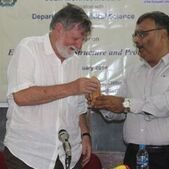I have had a long a happy relationship with India and was absolutely delighted when invited to be guest lecturer for the FMA at the University of Mangalore in Southern India. Mangalore, on the coast of the state of Karnataka is certainly not on the tourist itinerary but given the beauty of its temples, mosques and nearby hill country it certainly should be. Beyond tourist attractions Mangalore has the perhaps un-expected status as being amongst the 50 most “liveable” cities in the world in terms of quality of life and as such the highest rated Indian city.
More impressively Mangalore rates 12th world city in terms of health care. The University campus is in a leafy suburb has also an outreach centre in Chikka Aluvara. I gave lectures in both and was greeted with typical Indian courtesy and intellectual curiosity. The University also has a city centre University College, where I also gave a lecture, which offers evening MAs courses for professional who wish to increase their qualifications. This fulfils one of my own educational commitments and that is “life-long learning”.
In addition I also gave a guest lecturer at the University of Manipal, one of the mo st modern state of the art educational centres I have seen anywhere in the world. One of the most attractive features of intellectual life in India is the politeness of the exchanges. There is seldom the feeling of trying to show how clever the questioner is. There is a sheer enjoyment of engagement without any inhibitions about disagreement. I also spoke to the local Chamber of Commerce and given the many commercial links which exists between India and the UK much concern was expressed about the effects of Brexit.
Concern was also expressed also about EU/India relations. I have been acting as adviser to the European Economic and Social Committee on a report on the Commissions “EU/Asia Connectivity” ideas which frankly give scant regard to the sheer complexity of “Asia”. India is a difficult partner for the EU, not least because its size gives it some counterbalance to the EU in bargaining power. “Europe” remains mainly a geographical concept, not a political one. Audiences certainly know the major member states of the EU but the extent to which modern Europe is integrated within the EU remains only vaguely appreciated.
My personal host, Professor Amin, was a fund of information about India and arranged some wonderful sight-seeing excursions to temples, mosques and the nearly hill stations in the Coorg region famous for its spices, exotically flavoured wines and coffees. The multicultural character of India is staggering – and the facilities of Indians to use English as a lingua franca, plus their mother tongue, plus a local language is quite amazing. For those who rightly celebrate the diversity of Europe, my advice is go to India, to put our diversity into global perspective.


